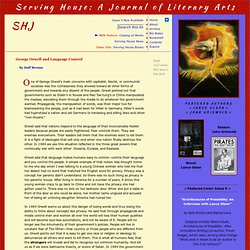

Documentary: George Orwell - A Life in Pictures. Sincerely, George Orwell. Literary reputation is an unstable thing.

Not so long ago, the luminaries were Hemingway, Fitzgerald, and Mailer, but one hardly hears about them these days, unless one of their novels is adapted for the screen. Certainly Arthur Koestler, a much more profound thinker than his contemporary George Orwell, told the same story and in prose that is even better (and in a language not his own). But it is the latter whose books remain in print and whose name has become a byword for the political destruction of individual freedom and thought. mondadori/getty images An instructive comparison is Orwell’s slightly older contemporary, Virginia Woolf.
George Orwell has certainly been fortunate in his editors. The first thing that surprises, especially because of the fame of Orwell’s essays, is the lack of literary style: He was not a great letter writer. It was said of Jonathan Swift, one of Orwell’s models, that “his personality is a problem which has not as yet disclosed the whole of his secret.” Ida Mabel Limouzin - Orwell's mother. 1984: The masterpiece that killed George Orwell. "It was a bright cold day in April, and the clocks were striking thirteen.

" Sixty years after the publication of Orwell's masterpiece, Nineteen Eighty-Four, that crystal first line sounds as natural and compelling as ever. But when you see the original manuscript, you find something else: not so much the ringing clarity, more the obsessive rewriting, in different inks, that betrays the extraordinary turmoil behind its composition. Probably the definitive novel of the 20th century, a story that remains eternally fresh and contemporary, and whose terms such as "Big Brother", "doublethink" and "newspeak" have become part of everyday currency, Nineteen Eighty-Four has been translated into more than 65 languages and sold millions of copies worldwide, giving George Orwell a unique place in world literature. The circumstances surrounding the writing of Nineteen Eighty-Four make a haunting narrative that helps to explain the bleakness of Orwell's dystopia. There were other influences at work.
Serving House Journal: Nonfiction: Duff Brenna: George Orwell and Language Control. One of George Orwell’s main concerns with capitalist, fascist, or communist societies was the ruthlessness they showed toward all other forms of government and towards any dissent of the people.

Orwell pointed out that governments such as Stalin’s in Russia and Mao Tse-tung’s in China manipulated the masses, educating them through the media to do whatever the government wanted. Propaganda, the manipulation of words, was their major tool for brainwashing the people, just as it had been for Hitler in Germany. Hitler’s words had hypnotized a nation and set Germans to harassing and killing Jews and other “non-Aryans.” Orwell said that nations respond to the language of their inconceivably foolish leaders because people are easily frightened.
Fear controls them. Orwell said that language makes humans easy to control—control their language and you control the people. In 1984 Orwell warns us about this danger of losing words and thus losing the ability to think about concepts like privacy.